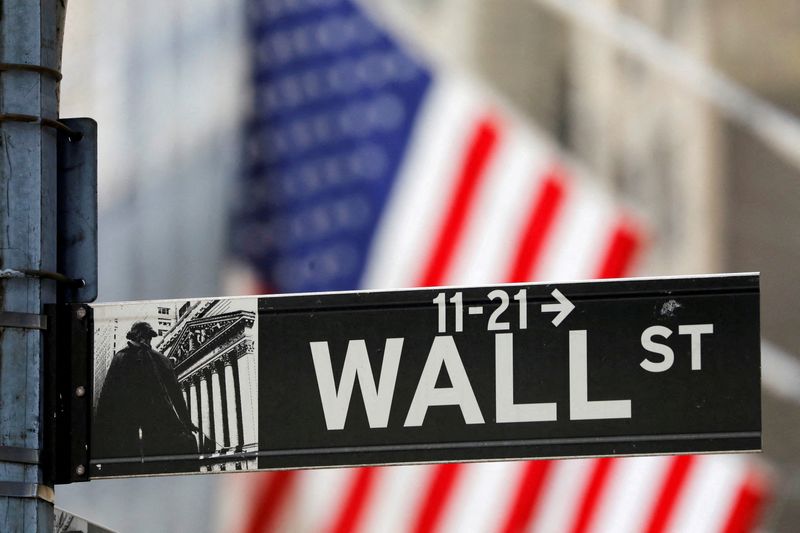By Mike Dolan
LONDON (Reuters) -Worried about a hawkish Fed, over-valued stocks, teetering debt piles, volatile currencies, cliffhanger elections or rancorous geopolitics? Relax and don't over-think it.
For those with long-term savings horizons, the temptation to overtrade and overpay fees for sophisticated investment management, esoteric financial products and expensive hedging may just not be worth it.
Despite a never-ending debate about the merits of active or passive investing and the perennial search for index-beating "alpha", the surest, cheapest and least taxing strategy over the long term may be a simple combination of two diversified passive funds.
One should track top global stocks and the other equivalent corporate bonds, both hedged to domestic currency.
Then just go fishing.
So reckons JPMorgan's long-term investment strategists Jan Loeys and Alexander Wise, who dub their favoured approach KISS, or "Keep it Simple, Stupid", after the long-standing design principle on avoiding complexity where possible.
"Our main contention is not that KISS investing is absolutely optimal and doing anything else is irrational or a bad investment," Loeys and Wise told clients this week.
"Our point is instead that we believe you can achieve most, if not all of your financial objectives by following our KISS approach," they said. "Adding more products or complexity in our mind produces steadily falling extra benefits."
The JPMorgan team acknowledges that short-term trading and market timing by hedge funds or other active players are critical to market efficiency and liquidity and can make big killings. But by so quickly arbitraging away market pricing anomalies before most investors can even spot them, there's not much juice left for much of the market.
"The lifetime of any new 'alpha' ideas has gotten shorter and shorter," they said.
But their main rationale for longer-term savers to keep it simple riffs largely off the fact that any outperformance just doesn't seem to compensate much for the fund manager selection risks, higher fees, transaction taxes and the sheer time spent monitoring more complex or esoteric portfolios.
What's more, they reckon the fewer the assets one has in a portfolio, the easier it is to judge risk on them.
KISS AND TELL
By way of example, Loeys and Wise examine 24 years of monthly hedge fund returns in excess of what that simple global equity/bond portfolio would have delivered, with weights to give the same return volatility on a rolling basis.
These have a patchy record over the past 10 years and rarely topped 10% over the past two decades, even though they have been positive post-pandemic. These are mostly complex strategies and often lack transparency, have high fees and significant manager risk.
According to HFR hedge fund research, the HFRI Fund Weighted Composite Index has underperformed S&P 500 total returns in all but one of the last 10 years.
Other arguments include how longer-term "value" investors can struggle for years to beat the market, how "undervalued" stocks get whipped away quickly and how many index-leading stocks can remain overvalued for long periods.
Just ask Warren Buffett.
Despite a stellar 60-year sojourn for his Berkshire Hathaway (NYSE:BRKa) vehicle's strategy of picking unfashionable and undervalued stocks, he can't find many left these days.
Speaking at Berkshire's annual meeting last weekend, Buffett said he expected the conglomerate's cash pile, now a record $189 billion, to keep growing. That's more than half the size of the firm's $335 billion equity portfolio.
Acknowledging the pain for stock-picking funds trying to beat passive indexes now dominated by Big Tech megacaps, Boston-based value investor GMO earlier this year showed how almost three quarters of large cap "blend managers" underperformed the S&P 500 last year and 90% of them lagged over the decade.
With total returns on MSCI's all-country world index topping 400% for the past 20 years - a middle ground between the 600% for the S&P 500 and 200% for the euro zone STOXX index - the passive equity ride's been pretty impressive even when you throw in seismic 2008 and 2020 drawdowns.
On the bonds part of the two-fund "KISS" portfolio, the JPMorgan strategists stress it should be diversified global corporate debt that excludes sovereign bonds, which they feel are prone to "financial repression" risks from governments forcing institutions to invest and structurally overvaluing them.
Total returns on the Bloomberg Global Aggregate bond index that excludes government bonds, for example, have been 50% since the index's inception in 2010.
Even with U.S. investment grade corporate debt premia over U.S. Treasuries down to 15-year lows, the JPMorgan analysts say their models suggest there's more than an 80% chance they continue to outperform over the next 10 years.

"Keeping things simple in finance, fewer assets, simple valuation rules, simple investment rules, is an underrated strategy," they conclude.
The opinions expressed here are those of the author, a columnist for Reuters.